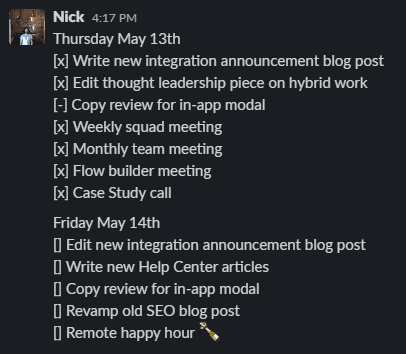The Daily Scrum: What It Is and How Unito Does It
Scrum is not just a term for that moment in a rugby match where everyone piles in to try and get the ball. It’s actually a product framework that keeps development teams agile and flexible. While it’s often used by product teams to promote the development and release of better products in less time, everyone from marketers to researchers can benefit from it. It’s a framework best adapted to teams that want to work more quickly, with regular deliverables. A crucial part of making the Scrum framework happen is the daily scrum.
What’s the daily scrum? How does it work? And what’s Unito’s spin on it? Read on to find out.
A daily scrum definition
The daily scrum is a quick meeting — usually about 15 minutes — during which each member of your team can give everyone an update on their work. These meetings are often used by development and other software teams. To keep the meeting brisk, each person should only take a few minutes to speak, answering these three questions:
- “What did you do yesterday?”
- “What will you do today?”
- “Are there blockers preventing you from doing your work?“
The goal isn’t to give a complete rundown of everything everyone’s been working on. Instead, people should focus on high-level summaries of high-priority tasks. Additionally, that summary should convey how each person’s daily work is contributing towards an overall team goal, usually identified during a sprint planning meeting.
A daily scrum can get a bit chaotic without proper guidance. That’s where the Scrum Master comes in.
The Scrum Master’s role
The Scrum Master is responsible for ensuring that Scrum methodology is respected by the team. They’re the subject matter expert, the go-to resource, the human encyclopedia for everything Scrum-related. Part of their role is promoting the education of new team members on Scrum methods, but they have specific responsibilities during the daily scrum:
- Keeping the daily scrum within 15 minutes: It’s easy to spill over this time slot, especially with larger teams. A Scrum Master can use subtle nudges and reminders throughout so that everyone can give their updates without keeping an eye on the clock.
- Making sure the meeting happens: When deadlines loom, it’s easy to skip out on any unnecessary meetings. Part of the Scrum Master’s job is making sure everyone takes the daily scrum seriously and attends, even during crunch time.
- Stakeholder management: Sometimes, external observers will attend a daily scrum. Maybe they want to be kept in the loop for an important cross-functional project, or they’re trying to apply agile methodologies to their own team. In these cases, the Scrum Master can make sure that observers don’t disrupt the daily scrum.
During the daily scrum, a Scrum Master is part timekeeper, part conductor, part bodyguard.
The daily scrum — Unito style
Unito is all about asynchronous work, especially after we all had to shift to remote work. But even before that shift, we were conducting our daily scrum’s completely asynchronously. No in-person meetings, no Scrum Masters, no time restrictions. That’s because we wanted to keep the essential benefits of the daily scrum without some of its limitations. It’s important for everyone in the company to have visibility on what their coworkers are doing, but we didn’t want to stick everyone in a meeting room.
So instead of a meeting, we use Slack, our chat app of choice, to conduct an asynchronous daily scrum every day. We do this with a dedicated Slack channel where everyone is encouraged to post their update. These updates follow the standard premise of the daily scrum: what you did yesterday and what you’re doing today. Here’s what that looks like:

Every line represents a task or meeting I have to take care of that day. Xs mark completed tasks while dashes are for tasks I didn’t get to — hence why “copy review for in-app modal” shows up both days. And because all of this is transparent to other teams, anyone can start a thread under my update if they have anything to add. This means we’re avoiding a meeting and making information more available to everyone. It’s a win-win.
Scrum chums
The daily scrum is crucial for agile teams who want to know what their teammates are up to. It doesn’t have to take more than 15 minutes, everyone can quickly cover what they’ve done and what they’re doing, and ask for help if needed. At Unito, we push this one step further by doing everything asynchronously through Slack. Try integrating this meeting into your workflow. You’ll be surprised by just how much more productive your teams are.


